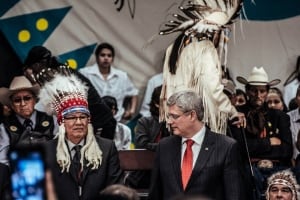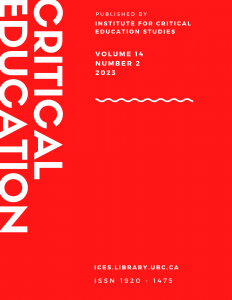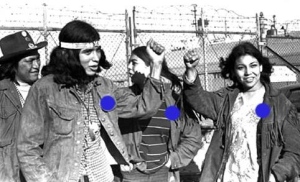
Prime Minister Stephen Harper and Chief Charles Weasel Head at last week’s announcement about changes to First Nation education. (Photo by Arnell Tailfeathers)
Angela Sterritt, CBC News, February 12, 2014– Twila Singer knows a thing or two about education on-reserve.
All five of her children are part of the Kainai First Nation and went to school on the Blood Tribe Reserve – in Blackfoot territory – close to Stand Off in southern Alberta. Her eldest son is now in college and her youngest is in Grade 1.
So when Singer caught wind of a community event last week, where Prime Minister Stephen Harper was to announce a historic education agreement between the federal government and First Nations, she put her ear to the ground.
“No one knew what was going on, we were left in the dark,” said Singer.
The release also publicized a peaceful rally outside the Kainai Nation High School, where Prime Minister Stephen Harper made his announcement related to First Nations education.
On the day of the event, Singer made the decision to go inside for the announcement.
“We just prayed and decided that it would be OK, it would be safe to go in,” she said, but she didn’t expect what unfolded once they arrived inside.
Blue dots for uninvited guests
“We were separated at the door and given either a blue dot or a yellow dot. The blue dots were uninvited guests and were ushered to the gymnasium, and the invited guests were the yellow dots and they were brought to the auditorium where the dignitaries were.”
Along with about 40 others in the gym, Singer and her daughters, aged seven and 17, viewed what was happening in the auditorium on TV monitors. At the end, the invited guests were directed to go to the gym for a feast.
That’s when Singer was kicked out – for tweeting.
“I was so confused. Everyone around me was on their phone. My baby has never experienced violence or anger, she started to cry, so I left. In all honesty I was really embarrassed.”
Then, her 17-year old daughter was asked to leave.
In a video posted online, Singer’s teen daughter, Bryn Taylor, is seen being confronted by three men, two standing in front of her, and one man at her side. The man on the side wraps his arm around her back for almost a minute, and then lifts her up by her arm.
As people behind her shout “leave her alone” and “this is what my reconciliation looks like,” two men pick her up by each arm and she hits the floor, then they pick her up and escort her out.
“Our families were in there, our people were in there, people who we love and interact with every day, and I think she was wanting somebody to say something,” said Singer.
She said the air of silence mixed with confusion captured the essence of the announcement about changes to the First Nations Education Act that day.
“We didn’t develop it, or have a referendum on it, we were left out of the loop,” she said.
Lacking consultation
The Blood Tribe and Kainai Board of Education also put out a press release on the day of the announcement that said the proposed act “has not met the Crown’s legal duty to consult and accommodate.”
The release said the “proposed legislation is being forced on the Blood Tribe and it is similar to how the government assimilated Blood children through Indian residential schools.”
But consultation is something the engineers of the proposed First Nations control of First Nations education act tout. According to the official website, the agreement is the result of “intensive consultations, discussions, dialogue and studies.”
It stated that “the first phase included eight consultation sessions across Canada, more than 30 video and teleconference sessions, and online consultation activities, was completed in May 2013.”
Arnell Tailfeathers, who was at the announcement as an invited guest in a media capacity tweeted to @CBC_Aboriginal, “Treaty 7 chiefs had a teleconference with Valcourt in Calgary. Valcourt hung up on them after he was done speaking.”
For Saddle Lake councillor Shannon Houle, the federal government’s assertion of consultation could not be further from the truth.
Read More: CBC News


 Follow
Follow


